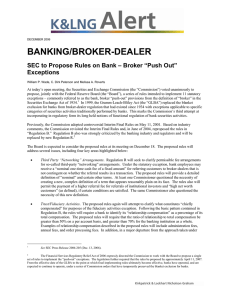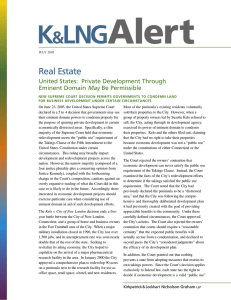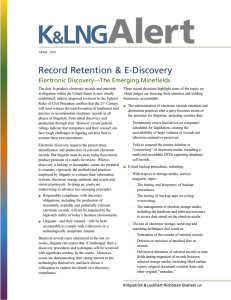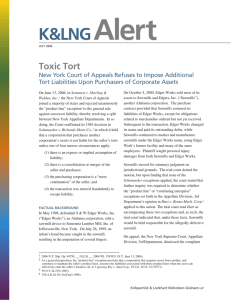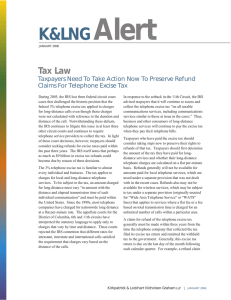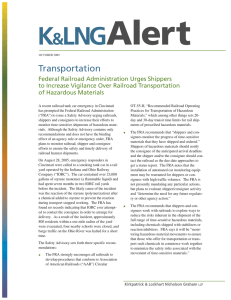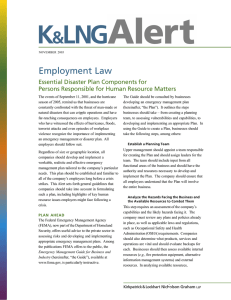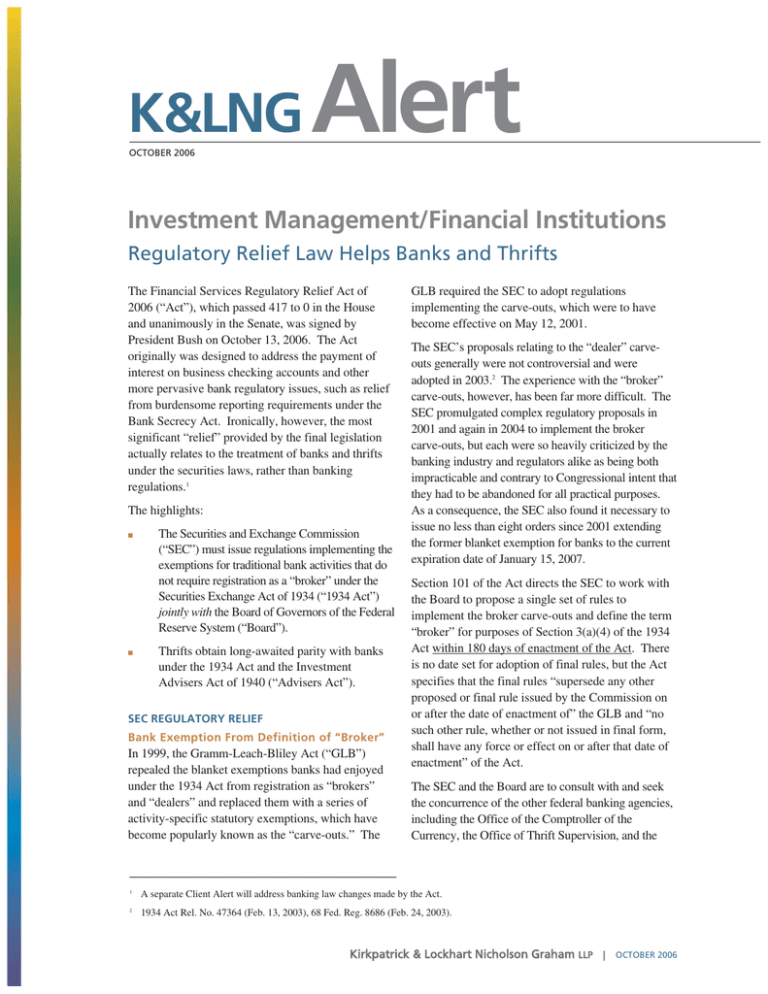
K&LNG
OCTOBER 2006
Alert
Investment Management/Financial Institutions
Regulatory Relief Law Helps Banks and Thrifts
The Financial Services Regulatory Relief Act of
2006 (“Act”), which passed 417 to 0 in the House
and unanimously in the Senate, was signed by
President Bush on October 13, 2006. The Act
originally was designed to address the payment of
interest on business checking accounts and other
more pervasive bank regulatory issues, such as relief
from burdensome reporting requirements under the
Bank Secrecy Act. Ironically, however, the most
significant “relief” provided by the final legislation
actually relates to the treatment of banks and thrifts
under the securities laws, rather than banking
regulations.1
The highlights:
■
■
The Securities and Exchange Commission
(“SEC”) must issue regulations implementing the
exemptions for traditional bank activities that do
not require registration as a “broker” under the
Securities Exchange Act of 1934 (“1934 Act”)
jointly with the Board of Governors of the Federal
Reserve System (“Board”).
Thrifts obtain long-awaited parity with banks
under the 1934 Act and the Investment
Advisers Act of 1940 (“Advisers Act”).
SEC REGULATORY RELIEF
Bank Exemption From Definition of “Broker”
In 1999, the Gramm-Leach-Bliley Act (“GLB”)
repealed the blanket exemptions banks had enjoyed
under the 1934 Act from registration as “brokers”
and “dealers” and replaced them with a series of
activity-specific statutory exemptions, which have
become popularly known as the “carve-outs.” The
GLB required the SEC to adopt regulations
implementing the carve-outs, which were to have
become effective on May 12, 2001.
The SEC’s proposals relating to the “dealer” carveouts generally were not controversial and were
adopted in 2003.2 The experience with the “broker”
carve-outs, however, has been far more difficult. The
SEC promulgated complex regulatory proposals in
2001 and again in 2004 to implement the broker
carve-outs, but each were so heavily criticized by the
banking industry and regulators alike as being both
impracticable and contrary to Congressional intent that
they had to be abandoned for all practical purposes.
As a consequence, the SEC also found it necessary to
issue no less than eight orders since 2001 extending
the former blanket exemption for banks to the current
expiration date of January 15, 2007.
Section 101 of the Act directs the SEC to work with
the Board to propose a single set of rules to
implement the broker carve-outs and define the term
“broker” for purposes of Section 3(a)(4) of the 1934
Act within 180 days of enactment of the Act. There
is no date set for adoption of final rules, but the Act
specifies that the final rules “supersede any other
proposed or final rule issued by the Commission on
or after the date of enactment of” the GLB and “no
such other rule, whether or not issued in final form,
shall have any force or effect on or after that date of
enactment” of the Act.
The SEC and the Board are to consult with and seek
the concurrence of the other federal banking agencies,
including the Office of the Comptroller of the
Currency, the Office of Thrift Supervision, and the
1
A separate Client Alert will address banking law changes made by the Act.
2
1934 Act Rel. No. 47364 (Feb. 13, 2003), 68 Fed. Reg. 8686 (Feb. 24, 2003).
Kirkpatrick & Lockhart Nicholson Graham LLP |
OCTOBER 2006
Federal Deposit Insurance Corporation (“FDIC”).
The SEC has announced that it intends to propose the
joint rule by the end of 2006. Recognizing that banks
will need time to implement systems to comply with
the rules, the SEC also has stated its intention of
having a delayed effective date in the final rule, which
the SEC estimates will be adopted in the summer of
2007.
Thrift Parity With Banks
Section 401 of the Act amends the 1934 Act and the
Advisers Act to add federal and state-chartered
savings associations and savings banks, commonly
known as “thrifts,” to the respective definitions of
the term “bank” under those statutes.3 This change,
long awaited and sought after by the thrift industry,
gives thrifts parity with banks for purposes of
exemptions from registration as “brokers” under the
1934 Act and as “investment advisers” under the
Advisers Act.4
In 2004, the SEC published proposed regulations that
would have provided a narrow exemption from
Advisers Act registration to thrifts that limited their
investment management and advisory activities to a
limited range of fiduciary accounts. Under that
proposal, fiduciary accounts would have been
segregated into two categories: 1) thrifts that
provided services only to “traditional” trust, estate,
and guardianship accounts would have been exempt
from registration; and 2) thrifts that provided
services to investment management agency accounts,
revocable trusts, and other accounts that, in the
SEC’s view, are not established for a “fiduciary
purpose” would have been required to register as
investment advisers. The Act in contrast makes no
such distinctions.
This section of the Act is effective upon enactment.
For those thrifts presently registered with the SEC as
investment advisers that wish to de-register, there is
a de-registration process under the Advisers Act and
regulations adopted by the SEC, which is presumably
available to them.
A registrant may withdraw its registration with the
SEC by filing Form ADV-W. The withdrawal is
effective upon filing except that the registration
continues for a period of 60 days solely for purposes
of establishing jurisdiction to allow the SEC to
determine whether there were any regulatory
problems with the registrant that should be
addressed by SEC action prior to accepting the
withdrawal of registration.
Thrifts withdrawing their SEC investment adviser
registrations should also consider the effect of deregistration on any related state filings and whether
de-registration with the SEC could trigger the
requirement to register in a state in which the thrift
conducts investment advisory activities. Although
many states have an exemption from the definition of
investment adviser for “banks,” state securities laws
vary widely and it is important to check the law in
each state in which advisory activities are conducted
before deciding on SEC de-registration.
* * *
Lawyers of Kirkpatrick & Lockhart Nicholson
Graham LLP’s Investment Management and
Financial Institutions practice groups advise banks,
trust companies, hedge fund managers and registered
investment companies about a wide range of
regulatory and transactional matters. We are
available to work with clients in assessing the
implications resulting from the Act and related
matters on request.
Rebecca H. Laird
202.778.9038
rlaird@klng.com
3
As amended, the definitions of “bank” under the 1934 Act (Section 3(a)(6)) and the Advisers Act (Section 202(a)(2)) now include a
state-chartered “savings association,” as defined in Section 2(4) of the Home Owners’ Loan Act (“HOLA”). That section defines
“savings association” to mean a savings association as defined in Section 1813 of the FDIA, the deposits of which are insured by the
FDIC. Consequently, a nondepository, non-FDIC-insured, state-chartered savings association would not have the benefit of the
thrift parity provisions. The 1934 Act and Advisers Act definitions of “bank” also now include a “federal association,” as defined in
Section 2(5) of the HOLA, which in turn defines that term to include a “federal savings association or federal savings bank chartered
under the Home Owners’ Loan Act.” This definition does not reference FDIC insurance. Consequently, a federal savings association or savings bank need not be an FDIC-insured institution to take advantage of the parity provisions; however, a state-chartered
“savings association” must be FDIC-insured in order to take advantage of the parity provisions.
4
The SEC had provided effective parity for thrifts and banks for purposes of the 1934 Act’s definitions of broker and dealer by regulation. 12 C.F.R. § 242.773. The statutory changes made by the Act appear to eliminate the utility of the regulation. The change
also has the effect of correcting a technical problem that existed for thrifts that offer collective investment funds. Securities issued
by a collective investment fund established by a bank are exempt from registration under Section 3(a)(12) of the 1934 Act. As a
result of the change in the definition of “bank” to include thrifts, securities issued by a collective investment fund established by a
thrift will also be exempt from registration under the 1934 Act.
2
Kirkpatrick & Lockhart Nicholson Graham
LLP
|
OCTOBER 2006
If you have questions or would like more information about K&LNG’s Investment Management and Financial Institutions
Practices, please contact one of our lawyers listed below:
BOSTON
Joel D. Almquist
Michael S. Caccese
Mark P. Goshko
Thomas Hickey III
Nicholas S. Hodge
John C. Hutchins
Stephen Moore
Stanley V. Ragalevsky
George Zornada
WASHINGTON
617.261.3104
617.261.3133
617.261.3163
617.261.3208
617.261.3210
617.951.9165
617.951.9191
617.951.9203
617.261.3231
jalmquist@klng.com
mcaccese@klng.com
mgoshko@klng.com
thickey@klng.com
nhodge@klng.com
jhutchins@klng.com
smoore@klng.com
sragalevsky@klng.com
gzornada@klng.com
HARRISBURG
Raymond P. Pepe
717.231.5988 rpepe@klng.com
LONDON
Philip Morgan
+44.20.7360.8123 pmorgan@klng.com
LOS ANGELES
William P. Wade
310.552.5071 wwade@klng.com
NEW YORK
Robert J. Borzone, Jr.
Jeffrey M. Cole
Elwood F. Collins
Steven H. Epstein
Alan M. Hoffman
Bruce J. Kahne
Beth R. Kramer
Richard D. Marshall
Lorraine Massaro
Scott D. Newman
Thomas C. Russler
212.536.4029
212.536.4823
212.536.4005
212.536.4830
212.536.4841
212.536.4019
212.536.4024
212.536.3941
212.536.4043
212.536.4054
212.536.4068
rborzone@klng.com
jcole@klng.com
ecollins@klng.com
sepstein@klng.com
ahoffman@klng.com
bkahne@klng.com
bkramer@klng.com
rmarshall@klng.com
lmassaro@klng.com
snewman@klng.com
trussler@klng.com
PITTSBURGH
Steve J. Adelkoff
412.355.6325 sadelkoff@klng.com
Kristen Larkin Stewart 412.355.8975 kstewart@klng.com
Clifford J. Alexander
Diane E. Ambler
Mark C. Amorosi
Catherine S. Bardsley
Arthur J. Brown
Arthur C. Delibert
Jennifer R. Gonzalez
Robert C. Hacker
Kathy Kresch Ingber
Henry L. Judy
Michael J. King
Rebecca H. Laird
Deborah A. Linn
Cary J. Meer
Dean E. Miller
R. Charles Miller
Charles R. Mills
R. Darrell Mounts
C. Dirk Peterson
David Pickle
Alan C. Porter
Theodore L. Press
Francine J. Rosenberger
Robert H. Rosenblum
William A. Schmidt
Lori L. Schneider
Lynn A. Schweinfurth
Donald W. Smith
Fatima S. Sulaiman
Ira L. Tannenbaum
Martin D. Teckler
Roger S. Wise
Robert A. Wittie
Robert J. Zutz
202.778.9068
202.778.9886
202.778.9351
202.778.9289
202.778.9046
202.778.9042
202.778.9286
202.778.9016
202.778.9015
202.778.9032
202.778.9214
202.778.9038
202.778.9874
202.778.9107
202.778.9371
202.778.9372
202.778.9096
202.778.9298
202.778.9324
202.778.9887
202.778.9186
202.778.9025
202.778.9187
202.778.9464
202.778.9373
202.778.9305
202.778.9876
202.778.9079
202.778.9223
202.778.9350
202.778.9890
202.778.9023
202.778.9066
202.778.9059
calexander@klng.com
dambler@klng.com
mamorosi@klng.com
cbardsley@klng.com
abrown@klng.com
adelibert@klng.com
jgonzalez@klng.com
rhacker@klng.com
kingber@klng.com
hjudy@klng.com
mking@klng.com
rlaird@klng.com
dlinn@klng.com
cmeer@klng.com
dmiller@klng.com
cmiller@klng.com
cmills@klng.com
dmounts@klng.com
dpeterson@klng.com
dpickle@klng.com
aporter@klng.com
tpress@klng.com
francine.rosenberger@klng.com
rrosenblum@klng.com
william.schmidt@klng.com
lschneider@klng.com
lschweinfurth@klng.com
dsmith@klng.com
fsulaiman@klng.com
itannenbaum@klng.com
mteckler@klng.com
rwise@klng.com
rwittie@klng.com
rzutz@klng.com
SAN FRANCISCO
Jonathan D. Jaffe
415.249.1023
Elaine A. Lindenmayer 415.249.1042
David Mishel
415.249.1015
Mark D. Perlow
415.249.1070
Richard M. Phillips
415.249.1010
jjaffe@klng.com
elindenmayer@klng.com
dmishel@klng.com
mperlow@klng.com
rphillips@klng.com
www.klng.com
BOSTON • DALLAS • HARRISBURG • LONDON • LOS ANGELES • MIAMI • NEWARK • NEW YORK • PALO ALTO • PITTSBURGH • SAN FRANCISCO • WASHINGTON
Kirkpatrick & Lockhart Nicholson Graham (K&LNG) has approximately 1,000 lawyers and represents entrepreneurs, growth and middle market companies, capital
markets participants, and leading FORTUNE 100 and FTSE 100 global corporations nationally and internationally.
K&LNG is a combination of two limited liability partnerships, each named Kirkpatrick & Lockhart Nicholson Graham LLP, one qualified in Delaware, U.S.A. and
practicing from offices in Boston, Dallas, Harrisburg, Los Angeles, Miami, Newark, New York, Palo Alto, Pittsburgh, San Francisco and Washington and one
incorporated in England practicing from the London office.
This publication/newsletter is for informational purposes and does not contain or convey legal advice. The information herein should not be used or relied upon in
regard to any particular facts or circumstances without first consulting a lawyer.
Data Protection Act 1988—We may contact you from time to time with information on Kirkpatrick & Lockhart Nicholson Graham LLP seminars and with our regular
newsletters, which may be of interest to you. We will not provide your details to any third parties. Please e-mail london@klng.com if you would prefer not to
receive this information.
IRS Circular 230 Notice:
To ensure compliance with requirements imposed by the IRS, we inform you that any U.S. federal tax advice contained in this communication (including any
attachments) is not intended or written to be used, and cannot be used, for the purpose of (1) avoiding penalties under the Internal Revenue Code or (2) promoting,
marketing, or recommending to another party any transaction or matter addressed herein.
© 2006 KIRKPATRICK & LOCKHART NICHOLSON GRAHAM LLP. ALL RIGHTS RESERVED.



